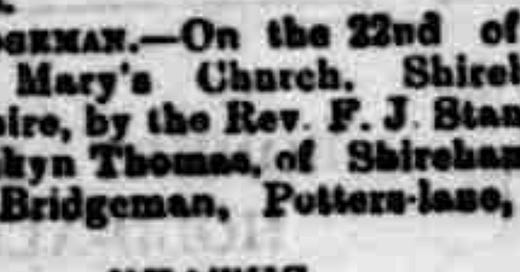Chasing down a bigamist
In Edwardian Britain, one Welshman led a private detective on a merry dance - but he got to his prey a day too late...
The career of William Oxley is only recorded in one Welsh newspaper report. This London-born, Sheffield-raised private detective was resident in Cardiff by 1881, and described himself as a private detective in the 1891 and 1901 censuses, but his single mention as such comes in 1903, and, unsurprisingly, it was in relation to a divorce case.
Taffs Well
The private detective was engaged by Alice Jane Thomas, who lived at the Walnut Tree Hotel in Taffs Well, six miles north of Cardiff. She had married her husband, contractor William Jenkyn Thomas, in Pontypridd in 1893; her husband had been 30 years old at the time. They had had two children, but their marriage had not been happy. On Christmas Eve, 1898, the couple separated, and Mr Thomas disappeared from home, failing to maintain either wife or children.
Alice Thomas wanted to know where her husband was - and Oxley duly tracked him across the West Country of England. He had stayed at Wellington in Shropshire (the 1901 census recording him boarding there, and claiming to be single) and Chipping Sodbury - in the company of 20-year-old Salvation Army lieutenant Ada Bridgeman.
Eventually, one Wednesday in September 1903, Oxley tracked down the couple in Shirehampton - only to find that he was a day too late. A day earlier, Mr Thomas had married Miss Bridgeman, despite Mrs Thomas being very much alive still. Not only had William Jenkyn Thomas deserted his wife, he had also now committed bigamy - and his wife's family were keen to boast about it, it seemed, as a marriage notice duly appeared in the Bridgemans' local paper.
The notice of William Jenkyn Thomas’s bigamous marriage, published in the Hants & Berks Gazette of 26 September 1903 (via British Newspaper Archive)
Oxley was able to get a warrant, and with a policeman, turned up at Thomas's work (he had found work as a builder's foreman in Shirehampton). He was duly arrested, and in November 1903, at the Gloucestershire Assizes, he pleaded guilty to bigamy and was sentenced to three months in prison. He stated in court that he and Alice had led "a very unhappy life for a great number of years" (it was five years, in fact, but perhaps felt longer). He argued that Alice's family were very well off and could look after her without him having to - and that he had treated "his second wife" (Ada) "extremely kindly". The judge, however, pointed out that William and Ada had only lived together for eight days in total.
“[We had led] a very unhappy life for a great number of years”
Records show that William and Ada married again on his release from prison - this time, in Ada's hometown of Basingstoke (Alice had instigated divorce proceedings while her husband was in court). William and Ada had five children in quick succession, all born in the Rotherham area, but three died before their first birthday, including twins. The 1911 census finds 'Willie' working as a clerk of works near Basingstoke, and living with Ada - but their two surviving children are missing, perhaps staying with relatives of Ada's.
William Jenkyn Thomas's life was different to, but no less interesting than, the life of the private detective sent to track him down. William Oxley had been born in London, but his iron moulder father Abraham was originally from Sheffield, and had lots of family there. When Abraham died prematurely in 1859, aged only 43, his widow Rosina upped sticks from her native Shoreditch and moved with her four children to her husband's hometown. Presumably, she hoped to get some support - whether emotionally or financially - from the Oxleys, but she seems to have still lived a hard life, working as a charwoman.
William Oxley may have regarded himself as much as a Yorkshireman as a Londoner - he was brought up in Sheffield from the age of nine. He did not follow into the profession of either his father or paternal grandfather (a grocer), but as a young man, he made the decision to enlist in the army. At the age of 20, he was a private based at Aldershot.
After the army, he joined the police, but not the Metropolitan Police, where so many private detectives learned their skills. The 1881 census records him as a police constable in Cardiff. William had married Emily Hockman in 1871, near his barracks (she was from that area), and Emily came with him to Cardiff. They did not have any children, although they seem to have informally adopted a Welsh girl at one point. William had become a private detective by 1891, although seems to have combined this with caretaking shops on St Mary's Street in central Cardiff. He continued to work as a private detective until 1909, when both he and his wife died in their adopted hometown.






Another well researched and informative piece. I always look forward to reading these pieces. Thank you